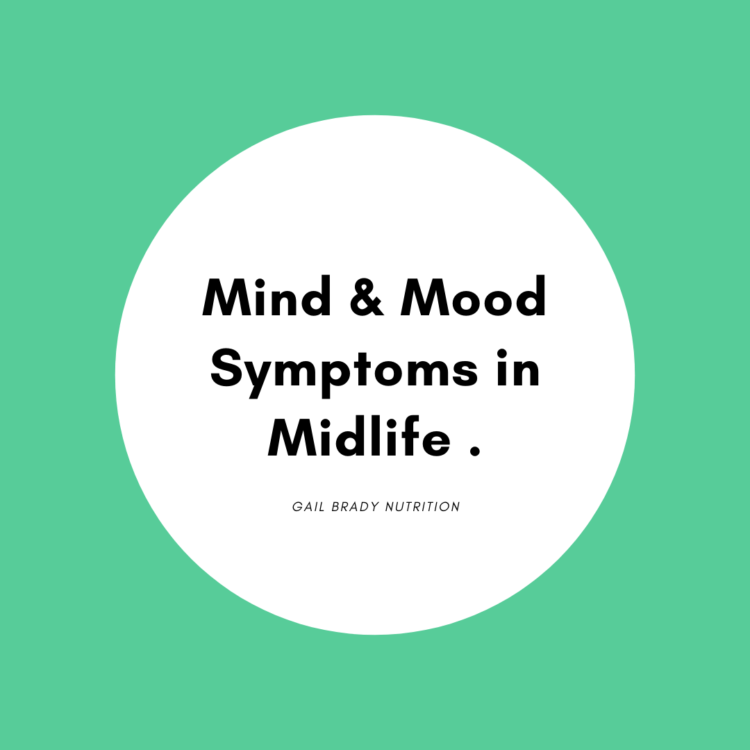Mind and mood issues are often the first type of symptoms to show up in perimenopause. They can also be some of the most challenging
According to research, there is an increased risk of depression, low mood, anxiety, and panic attacks at this life stage.
It is estimated that up to 70% of women suffer from depressive-type symptoms in perimenopause regardless of any previous history. This is compared to around 30% in premenopausal women.
According to women’s health specialist and medical doctor Sara Gottfried, psychological well-being for women aged 35-50 is lower than for any other age group.
In the longer term, mind and mood issues may also contribute to an increased risk of chronic diseases such as Alzheimer’s, obesity, type 2 diabetes, cardiovascular disease and certain cancers.
These symptoms have been associated with behaviours such as over-eating, drinking too much alcohol, and a general downward spiral of poor lifestyle.
Potential causes
The root cause of mind and mood symptoms can be triggered by fluctuating and decreasing levels of sex hormones.
Progesterone is often the first hormone to change. When progesterone starts to fall in your late 30s or early 40s, you may notice an increase in anxiety and low mood. If sleep is also an issue, these symptoms could be exacerbated.
Progesterone is known as a calming hormone. Lower levels can therefore be responsible for anxiety, irritability and even rage. These feelings may show up as worrying, ruminating, overwhelm and feeling unable to cope.
Declining levels of oestrogen may also cause a decrease in the neurotransmitters serotonin and GABA which can help to keep us happy and to keep anxiety at bay.
Low testosterone can contribute to mood issues as well as a lack of motivation and focus.
And increased levels of the stress hormones cortisol and adrenalin may also cause anxiety. Research has suggested that around 50% of people with depression have high levels of cortisol. Increased levels of cortisol have also been linked to lower levels of oestrogen and progesterone. Stress causes us to lose balance (homeostasis). It can decrease levels of GABA and cause changes in gut bacteria (microbiota). Research has shown a direct link between imbalances in the gut and anxiety and depression.
Low thyroid function is common in women in midlife and this may also cause mind and mood symptoms too.
Other potential triggers include a genetic predisposition, toxins, environmental factors, as well as potential nutrient deficiencies such as vitamin B12.
A diet and lifestyle approach
- Eat for calm – supporting blood sugar balance by eating a Mediterranean style diet with good quality proteins, healthy fats (extra virgin olive oil, avocado, omega 3 fatty acids from oily fish (sardines, mackerel, wild salmon) nuts and seeds (cashews, almonds, pumpkin seeds)and plenty of fresh vegetables especially dark green leafy vegetables and some fruit.
- Get your nutrient levels checked. Especially vitamin B12 and B6, zinc, magnesium and iodine. If you are veggie or vegan, you may also need the amino acid taurine.
- Support gut health – identify food intolerances and allergies and eliminate any foods which may cause an issue. Eat probiotic and prebiotic foods if you can tolerate them. Bone broth may also be beneficial
- Limit or remove caffeine, alcohol, gluten, dairy, refined and processed foods, GMO foods and reduce sugar intake.
- Manage stress – however that works for you; crafts, walks in nature, meditation, breathwork, journaling, yoga etc
- Get at least 15 mins of natural light ideally first thing in the morning
- Include moderate exercise on a regular basis. 3-4 times a week for at least 30 minutes
- Get enough sleep – Have a nightly wind-down and sleep hygiene routine. You can read more about this here
- For some people, supplements may be beneficial such as adaptogenic herbs and fish oils. These may not be appropriate for everyone so please seek advice from a qualified professional.
- I also offer testing packages that include markers for thyroid, stress and sex hormones.
For more tips and advice on perimenopause and menopause join a growing group of like-minded women here
To receive your FREE checklist of the Top 10 Foods to Include in Your Diet During Menopause click here




